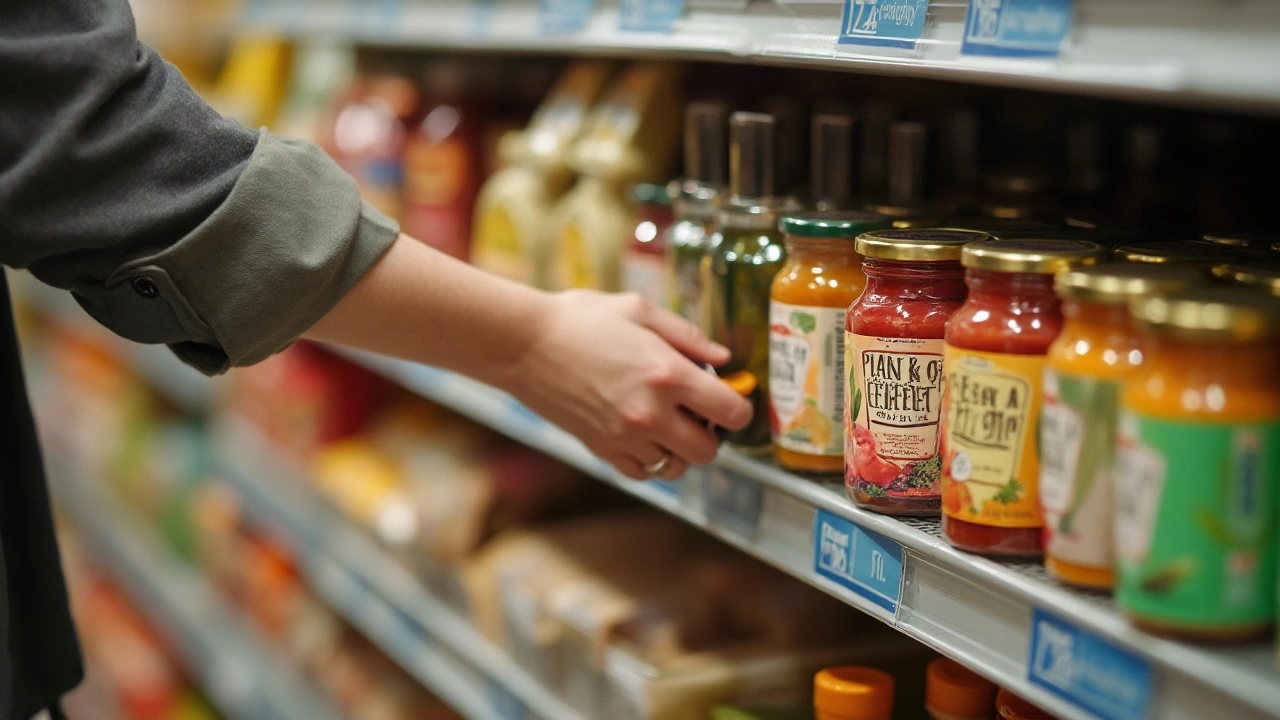Venturing into the realm of veganism can be quite an adventure, especially when discovering foods that are unexpectedly vegan. Whether you're adhering strictly to a plant-based diet or simply curious about vegan options, you might be amazed at the variety of foods that fit the bill. This article uncovers those hidden vegan gems that many might overlook.
In this journey, we'll explore an array of foods, from your favorite crunchy snacks to the essentials in your condiment stash, which are surprisingly free of animal products. You don’t have to compromise on taste either, as we reveal delicious foods that align perfectly with a vegan lifestyle. Get ready to broaden your culinary horizons with these vegan surprises!
- Introduction to Surprising Vegan Foods
- Chips and Crisps: Vegan Snacking Options
- Vegan-Friendly Condiments
- Unexpected Vegan Baked Goods
- Tips for Identifying Vegan-Friendly Foods
Introduction to Surprising Vegan Foods
Veganism has made a significant mark on the global food scene, transforming what we choose to eat and how we think about food. With the growing awareness of plant-based diets, many people are discovering that veganism isn't as restrictive as they once thought. There are exciting surprises awaiting in the world of vegan foods, which are not just limited to vegetables and tofu. What might shock many is that some foods originally thought to be non-vegan due to their composition are genuinely vegan. We are exploring those delightful surprises that fit snugly into a vegan lifestyle without compromising on taste or texture.
A good number of snacks, sweets, and even household staples fall under the category of unexpectedly vegan. For instance, a famous example is Oreos, the beloved cookie sandwich, made without any animal-derived ingredients. It's amazing how such a brand, loved universally, fits right into a plant-based diet by accident or design. There is so much more to discover beyond the familiar realm of known vegan foods. It's not just about finding alternatives but realizing that many of our beloved foods are plant-based, even in their original recipes.
Veganism extends beyond ethics for many; it merges with a journey of health and sustainability. Statistics show a steady increase in people adopting vegan habits; in the UK alone, there has been a remarkable rise in veganism by around 40% over the last few years. With such an increase, the market has adapted to provide a more extensive range of plant-based options. Grocery aisles are now stocked with wonderful surprises, allowing for more variety in daily meals. The challenge lies in identifying these gems amongst everyday products.
"Eating vegan doesn’t mean eating dull. Some of the best foods you've always enjoyed might already be vegan," affirms renowned food writer, Jack Norris.
This revelation offers a sense of delight and relief for both seasoned vegans and those embarking on their plant-based journey. It is an invitation to explore beyond the conventional, encouraging a shift in perspective. By broadening our view, we discover treasure troves of foods that not only align with vegan principles but also tantalize the taste buds enjoyably. This transformation in food appreciation underlines how veganism is not a sacrifice but an embrace of diverse flavors and approaches.
It is fascinating to observe how simple vegan discoveries can alter food explorations entirely. As you delve into the sea of vegan foods, remember that simplicity often holds the key to enjoyment. Beyond the essential snacks like crisps and sauces, venture into the realm of surprising staples that challenge the very idea of vegan limitations. These extraordinary discoveries reveal not only the versatility of plant-based eating but also the creativity employed in crafting foods that are indulgent and yet compassionately prepared.
Chips and Crisps: Vegan Snacking Options
When it comes to snacking, chips are an American and British staple, often enjoyed during movie nights or as a quick snack on the go. What might come as a delightful surprise is that many popular brands of chips and crisps are actually vegan foods, despite their savory appeal. These snacks can be made with surprisingly simple ingredients like potatoes, oil, and salt, all of which fit neatly into a plant-based lifestyle.
One common misconception is that any added flavoring in chips must contain some form of animal byproduct. However, brands such as Walkers and Lay’s offer a variety of flavors that are entirely plant-based. Smoky bacon or barbecue might sound deceptive, yet it's possible to replicate these flavors using smoked paprika and other spices, with no need for actual meat. Some brands go the extra mile by labeling their products as 'vegan-friendly', providing that extra layer of confidence. Interestingly, a study highlighted in the Vegan Society reports that the demand for vegan-friendly products has risen by 40% over the past two years, showing a positive trend for more accessible options.
There is also a considerable number of lesser-known brands thriving on the clean labeling of their ingredients, ensuring transparency and peace of mind for consumers. Brands like Hippeas and Eat Real capitalize on using lentils, chickpeas, and other legumes as bases for their crisps, which not only adds a delightful crunch but also a healthier twist with added protein and fiber. Popping down the snack aisle reveals how these unexpectedly vegan options are both flavorful and cater to ethical eating standards, a perfect find for the environmentally conscious snack lover.
"As people become more health-conscious and environmentally aware, they look towards foods that mirror their values," says James McGoff, co-founder of a vegan snack brand.
For those new to veganism, scrutinizing the ingredients list is vital. It’s remarkable how the absence of cheese powder or milk fats, which you’d expect in cheese-flavored crisps, leads to delightful vegan substitutes using nutritional yeast or cashew-based cheese dust. This innovation highlights the dynamic flavors that can be achieved even within the confines of plant-based ingredients. For decades, flavoring was dominated by non-vegan components, but now, the major player in creating captivating flavor profiles is the spice blend.
The creativity doesn’t stop there; a handful of companies are experimenting with vegetable-based sweet potato, beetroot, and kale chips, which are not only naturally vegan but also visually appealing and nutrient-rich. This expansion indeed shows how a shift to or exploration of a more mindful diet does not mean compromise. Instead, it opens up to ingenuity and the potential to explore foods that are both vegan-friendly and satisfyingly indulgent.
In summary, chips and crisps present a sphere of unsurpassed innovation in the vegan snack world. With an ever-growing market, fans of traditional snacks can indulge with confidence knowing that their choices align with plant-based values. Whether you covet the classic salt or hanker for the complex smoky notes, there’s a guaranteed spot in this realm for compassionate consumption.

Vegan-Friendly Condiments
Navigating your way through a plant-based lifestyle often involves revisiting familiar kitchen staples to ensure they're vegan. When it comes to condiments, you might be pleasantly surprised to find that many household favorites fall into the vegan categories. The ubiquitous ketchup, for instance, is commonly vegan, made simply from tomatoes, vinegar, sugar, and spices. It's important to note, though, that some brands might sneak in non-vegan ingredients like honey or even refined sugar that may have been processed with bone char, so it’s always essential to check labels. These small details can make a big difference in maintaining a fully plant-based diet.
Another unexpectedly vegan condiment is hot sauce, with popular varieties like Tabasco sauce comprising mainly of vine-ripened red peppers, vinegar, and salt. Such simple ingredient lists make it a hot favorite among vegans who crave a fiery kick. Soy sauce, a versatile seasoning in many cuisines, is typically vegan as well, containing only simple ingredients like soybeans, wheat, water, and salt. However, be on the lookout for versions flavored with fish or other animal-based seasonings, which are thankfully rare. You may even stumble upon recipes that list these sauces as essential plant-based ingredients due to their complex flavor profiles.
“The beauty of these singular ingredients lies in their ability to transform a dish while adhering to plant-based principles,” says culinary expert Linda Legume. “A dash of hot sauce or drizzle of soy sauce can magically elevate the taste of various dishes, making them more vibrant and exciting without compromising on vegan values.”
Mustard is another staple often found in vegan-friendly forms. Standard yellow mustard—made from mustard seeds, vinegar, salt, and a few spices—fits in perfectly with a plant-based lifestyle. Even the honey mustard variant is now being crafted with alternatives like maple syrup or agave, ensuring there's something for everyone. Vegan mayonnaise is an area where options have exploded, too, with new, innovative brands replacing eggs with ingredients like aquafaba or tofu to replicate that creamy texture. Look for varieties clearly labeled as plant-based or vegan-friendly to enjoy this condiment guilt-free.
A list of vegan-friendly condiments would be incomplete without mentioning pesto sauce. Traditional pesto might include Parmesan cheese, but vegans can rejoice in the increasing availability of versions sans cheese, replaced by nuts, nutritional yeast, or even lemon zest for that extra tang. This trend toward vegan inclusivity in condiment options also extends to classic salad dressings like ranch or Caesar, traditionally laden with dairy but now being reinvented with plant-focused ingredients like cashews or soy.
To make the most of these condiments, always consider reading the ingredient list. With deceptive marketing, familiar plant-based icons can be replaced with new formulas that aren't always obvious. Keeping an updated pantry filled with these essentials can support your culinary adventures and ensure your dishes are flavorful while remaining inline with your ethical choices.
Unexpected Vegan Baked Goods
For many people, the realm of baked goods represents mouth-watering aromas, tender textures, and a certain sense of comfort. Yet for those committed to a vegan lifestyle, entering a bakery often involves meticulous ingredient checks, seeking to ensure no animal products are lurking within their cherished treats. It's surprising, then, to uncover that a wide array of baked delights happen to be vegan-friendly without the intent of being so. Many are pleasantly shocked to learn that some traditional breads, pastries, and even cookies omit eggs, butter, and milk entirely from their recipes.
Consider breads like sourdough, which often only requires three simple ingredients: flour, water, and salt. Unlike its buttery peers, its crusty exterior and chewy interior make for a satisfying experience sans animal products. Moreover, several commercially available biscuits and pastries are also on the list of surprisingly vegan foods. They achieve their flaky layers by using plant-based oils or margarines.
According to a 2022 study by the Plant-Based Foods Association, nearly 40% of new product launches of sweet baked goods in the UK were either vegetarian or vegan by design, showcasing the shift towards accommodating plant-based diets.
Some cookie brands, especially those with simple recipes like sugar or ginger snaps, are often devoid of dairy or eggs. Flavors derived from spices and sugars can elevate these treats without compromising on flavor or texture. In the last decade, major manufacturers have increasingly embraced this trend, offering consumers widely available vegan options on shelves. This is not limited to any one type of baked good either; from cupcakes devoid of traditional frosting to bread rolls brushed with olive oil instead of butter, the choices are expanding every year.
A keen eye and a little label reading can reveal which cakes and pastries align with vegan principles. Certain family-owned bakeries proudly proclaim their use of almond milk, coconut oil, and flaxseed in place of conventional dairy and eggs. Additionally, clever vegan adaptations use ingredients such as aquafaba – the liquid from a can of chickpeas – as an egg replacement, providing the binding and leavening necessary for baked goods to maintain their traditional allure.
In exploring these unexpected vegan baked goods, you might chance upon delightful options that fit perfectly into your lifestyle, without the need for animal-derived ingredients. The joy of biting into a soft donut or a warm slice of fresh bread is no longer a distant memory for those who opt for a vegan diet. With an ever-growing dedication from both artisans and large-scale makers to cater to this demand, there’s never been a better time to indulge without compromise.

Tips for Identifying Vegan-Friendly Foods
For those treading the path of a plant-based lifestyle, identifying vegan-friendly products can indeed be a journey filled with challenges and discoveries. However, with a few tips and tricks, this task can become much less daunting. A crucial first step is mastering the art of deciphering ingredients lists, often printed in minuscule fonts on the packaging. Common culprits like gelatin, carmine, and certain E-numbers, which stand for additives, should be red flags for any vigilant vegan. Many people are amazed to find that common drinks like some wines and beers can have animal-derived ingredients due to the fining process. So, it's always wise to check for a vegan label or certification when unsure about beverages.
An effective strategy is also familiarizing oneself with the plethora of unexpected vegan terms often used in place of the straightforward ones we're more accustomed to. Take tallow, a form of beef or mutton fat commonly found in candies and foods, often lurking under the guise of 'rendered fat'. For the untrained eye, this can easily be overlooked. Checking the allergen warnings on product labels can provide additional insight, as they often list any potential animal-derived components. It's equally helpful to be aware of naturally plant-based, yet surprisingly surprising foods like certain chips and crisps, which can serve as delightful snacking options.
"Reading labels is an essential skill for vegans, as it helps avoid accidentally consuming animal products," says Jane Smith, a renowned vegan chef and educator.
Another valuable tip is to tap into technology by leveraging dedicated mobile apps designed specifically for scanning product labels to determine their vegan status. This method saves a significant amount of time and effort and offers peace of mind, especially for new vegans. Additionally, community forums and social media groups focused on veganism can be excellent resources for discovering new vegan foods and sharing tips. Fellow vegans often have tricks for navigating tricky groceries with unidentified ingredients. Shopping online also opens doors, as many e-commerce platforms have dedicated vegan sections, allowing a more streamlined search process for vegan items.
Lastly, notice how many products now proudly display a certified vegan logo, thanks to increased demand and consciousness among consumers. This seal simplifies shopping decisions and allows greater care to be placed on tasting and enjoying foods, rather than the painstaking work of deciphering lengthy ingredient labels. As more and more mainstream companies pivot towards offering plant-based options, consumers gain an even wider range of delectable vegan choices without compromising taste or ethical standards. Incorporating these techniques helps vegans access a wider variety of foods while remaining committed to their plant-based dietary preferences.

